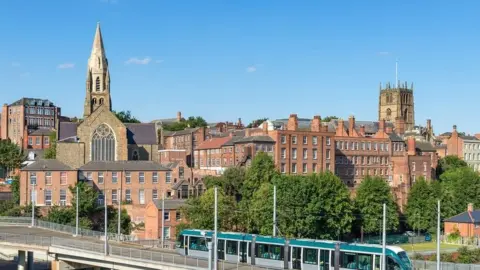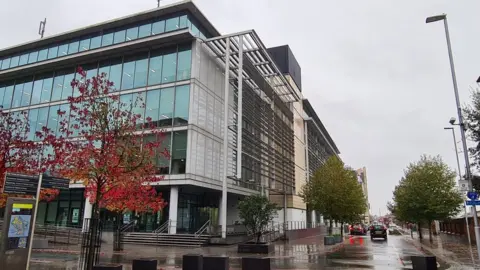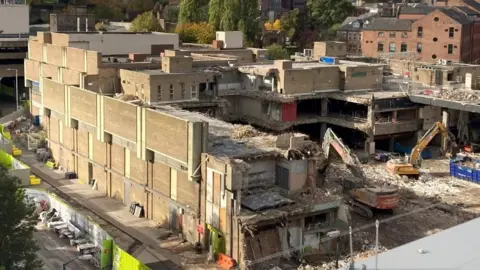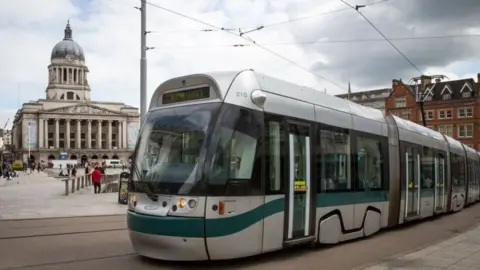'Bankrupt' Nottingham City Council's road to financial failure
 BBC
BBCA council's decision to declare itself effectively bankrupt has triggered a public and political inquest into how it reached the financial brink.
On Wednesday, Nottingham City Council issued a section 114 notice temporarily halting most new spending.
The council's leaders say it has suffered from the Covid-19 pandemic, soaring inflation and government underfunding.
But they have also admitted past financial failings have played a part.
In a letter to stakeholders, council chief executive Melbourne Barrett and Labour council leader David Mellen said specific major financial crises in recent years had depleted its reserves.
This, they said, had left the council more vulnerable to the wider stormy financial climate in local government.
 Robin Hood Energy/Facebook
Robin Hood Energy/FacebookOne of the city's key high-profile failings was its venture into the highly-competitive energy market.
The community-minded firm, Robin Hood Energy (RHE), was launched in 2015 with the intention of helping to tackle fuel poverty and taking on the big suppliers.
The flagship project grabbed national attention and attracted former Labour leader Jeremy Corbyn as a customer.
However, the company never turned a profit and had to be propped up with millions of pounds of tax-payer cash until it collapsed five years later.
A subsequent audit report accused the council of "institutional blindness" and of putting political priorities over financial reality.
A total of 230 jobs were lost when RHE folded, and leaked documents estimated the cost to local taxpayers to be as high as £38.1m.

RHE's failure prompted the government to appoint an oversight board in January 2021, to determine whether commissioners should run the council.
Later that year, it was found nearly £16m of funding - legally ringfenced for housing - had in fact been spent by the council on general services.
The cost of the wrongful spending rose to more than £51m, it was later revealed.
That triggered further government scrutiny of the council's finances but, in February this year, the Department for Levelling Up, Housing and Communities announced it was stopping short of appointing commissioners to run the council.
 LDRS
LDRSThe council has a further unresolved financial headache following its decision to invest £17m in a private-sector-led regeneration of the 1970s-built Broadmarsh shopping centre.
Having financially committed to the scheme in 2020, the council was forced to take charge of it when owners Intu fell into liquidation months later.
The council's three subsequent bids for £20m of levelling up funding to kickstart the project have not won government backing.
The prime city centre complex remains a building site with its future far from certain, given the council's painful financial circumstances, with the 1,000 new homes and 6,000 jobs predicted little more than a grand aspiration.

Further signs of the council's poor financial health have emerged in recent months.
In June, the authority's auditors, Ernst and Young, warned its financial management was "not fit for purpose".
The company pored through council accounts and, while it said it had found no evidence of fraud, it identified a work culture which was not focused on properly following accounting rules.
The auditors said they were concerned about the council's "inability to find documents" and said there had been a high risk of managers overriding established financial controls unintentionally or "for reasons including expediency, efficiency or self-interest".
At the time, the council said it was addressing the issues highlighted, but has been accused of lacking transparency by refusing to publish the auditors' report.
The council has said it is disadvantaged financially by the Nottingham's low council tax base, with 80% of properties in the city in bands A and B.
That means it can raise far less in council tax than areas with more high-band properties.
By contrast, in neighbouring Rushcliffe, only about 28% of properties are in the lowest two bands.
Inevitable cuts
The council has also said its funding from central government - the revenue support grant - has diminished, meaning it receives £100m less per year than it did a decade ago.
A council report on the section 114 notice said £20m of earmarked reserves had been "temporarily repurposed" to try to set a balanced budget for 2023-24 and that it used £9.5m of service held reserves to manage rising pressures.
However it still predicted it would spend £23m more than its income this year.
The authority cannot sign off any new spending and must hold an emergency meeting within 21 days to discuss next steps.
An amended budget is then likely to be approved and the council has warned cuts are "inevitable".

Follow BBC East Midlands on Facebook, on X, or on Instagram. Send your story ideas to [email protected].
